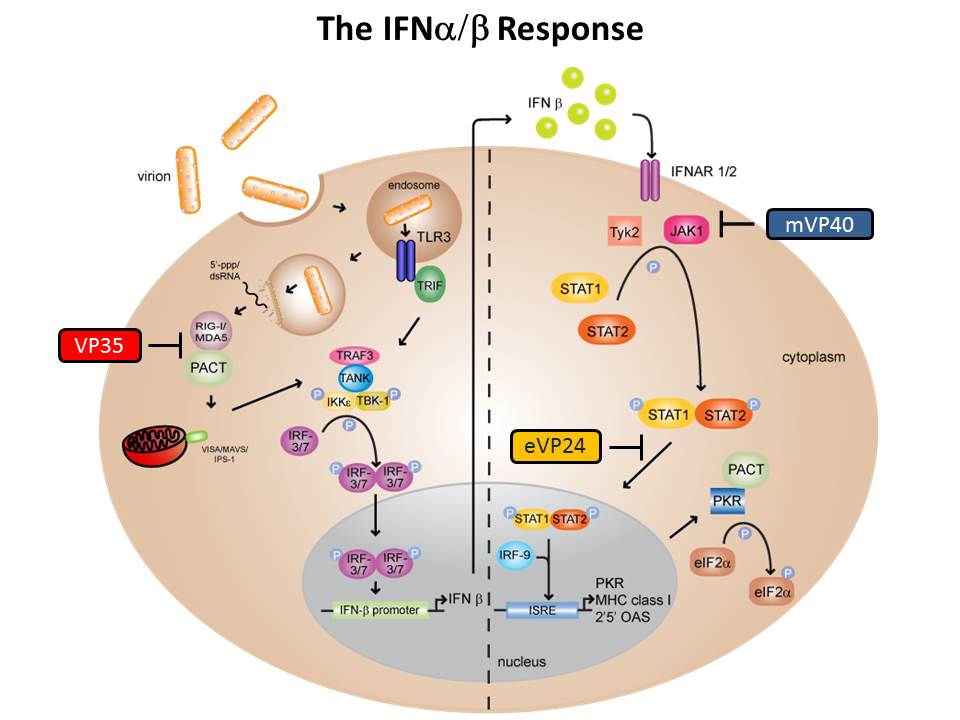Currently, the Basler Laboratory focuses on general four areas related to virus-host interactions. (1) Mechanisms of innate immune evasion by emerging RNA viruses, including the filoviruses Ebola virus and Marburg virus; (2) interactions of RNA viruses with importin alpha (IMPA) nuclear import factors and how these contribute to innate immune evasion; and (3) virus-host interactions that modulate RNA virus replication. For each of these directions, the lab is interested in mechanism of action and implications for viral pathogenesis. The final area of focus (4) is the identification novel therapeutic approaches, particularly via high throughput screening.
Mechanisms of innate immune evasion by emerging RNA viruses. The Basler lab has identified novel mechanisms of innate immune evasion for Ebola and Marburg virus, Nipah virus and New World alphaviruses. Examples include the identification of filovirus-encoded innate immune modulators that prevent production of type I interferons (IFN) via RIG-I-like receptor signaling pathways, that block IFN-induced Jak-STAT signaling and that activate cellular antioxidant response pathways. These studies have clarified how viral innate immune antagonists act as virulence determinants and provided insight into innate immune mechanisms of viral control.
Interactions of RNA viruses with importin alpha (IMPA) nuclear import factors. Many RNA viruses engage the host cell nuclear import machinery despite the fact that their replication occurs in the cytoplasm of the infected cell. The Basler lab’s interest in virus-IMPA interactions was initially spurred by the finding that the Ebola virus VP24 protein directly binds to a subset of IMPA family members, preventing IMPA interaction with the non-classical nuclear localization signal on activated STAT1. This blocks transcriptional responses to IFNs counteracting their antiviral activities. The lab has extended its inquiries into RNA virus-nuclear import pathway interactions by defining novel IMPA interactions with the Nipah virus W and matrix (M) proteins that are defining the molecular basis for W and M interactions with IMPA proteins and the contribution of nuclear functions to virus propagation. The lab is also pursuing studies to understand how coronaviruses, including SARS-CoV-2 and MERS coronavirus, modulate host nuclear trafficking to counteract innate immune responses.
Virus-host interactions that modulate RNA virus replication. Because viral innate immune evasion proteins typically carry out additional critical functions for the virus, the Basler lab has investigated virus-host interactions that modulate various aspects of viral replication. In a recent example, the Basler lab identified multiple host proteins possessing PPxPxY motifs as modulators of Ebola virus mRNA synthesis. These proteins restrict Ebola virus growth by binding and altering the phosphorylation status of the viral transcriptional activator VP30. The presence of multiple host factors that can restrict virus replication by targeting a single interaction interface on a viral protein is highly unusual. In another example, the lab implicated the PI3 kinase VPS34 and fatty acid metabolism as critical host factors needed for SARS-CoV-2 replication. The lab also identified 16 host genes whose knockout substantially and reproducibly modulates SARS-CoV-2 replication. These 16 affect innate immune signaling, membrane trafficking and actin dynamics. The mechanisms by which these modulate infection are currently being pursued.
High throughput screening approaches to identify inhibitors of RNA virus replication. Over the past several years, the Basler lab has made significant efforts to translate its findings into drug discovery efforts. The lab has developed and optimized for high throughput screening (HTS) several assays of filovirus innate immune evasion and replication functions and is developing assays to identify novel inhibitors of coronavirus RNA-dependent RNA polymerases. The latter project is part of the NIH-funded Antiviral Drug Discovery (AViDD) Centers for Pathogens of Pandemic Concern called the Center for Antiviral Medicines & Pandemic Preparedness (CAMPP).

